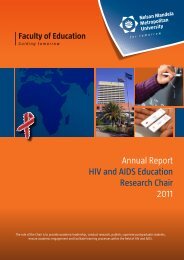USING A DIFFERENT LENS FOR HIV and AIDS EDUCATION ...
USING A DIFFERENT LENS FOR HIV and AIDS EDUCATION ...
USING A DIFFERENT LENS FOR HIV and AIDS EDUCATION ...
You also want an ePaper? Increase the reach of your titles
YUMPU automatically turns print PDFs into web optimized ePapers that Google loves.
Reflecting on using storyboarding (in relation to Participatory Video)<br />
Reflecting on storyboarding, in relation to<br />
participatory video, the first part, i.e. the<br />
brainstorming session to identify a „problem‟<br />
to be worked with, was very interesting in<br />
terms of the amount of information that can<br />
be generated on a particular topic within a<br />
short space of time. The only problem was<br />
that within the group, everybody wanted their<br />
idea to be the best one <strong>and</strong> reaching<br />
consensus was a challenge, but the process of<br />
„voting‟ using the red adhesive dots helped the<br />
group to reach consensus. It was also<br />
challenging working with the actual storyboard<br />
after we had chosen the topic, as, even though<br />
we agreed on the flow of the story, choosing<br />
the right wording suitable to reflect the idea in<br />
such a way that it can be played out <strong>and</strong><br />
filmed, took up a lot of time. This can be a<br />
dem<strong>and</strong>ing exercise within a classroom setting<br />
if the educator does not facilitate resolving the<br />
differences, especially if there is a dominant<br />
student in the group who wants to enforce<br />
his/her ideas.<br />
It is also interesting to see how the different<br />
groups, using the same prompt, came up with<br />
very different „problems‟ to be addressed. Our<br />
group worked with the cultural taboo status of<br />
sex talk <strong>and</strong> how this can impede effective<br />
teaching of <strong>HIV</strong> <strong>and</strong> <strong>AIDS</strong> within a classroom<br />
setting. What we wanted to show was the<br />
challenge faced by teachers when having to<br />
answer sensitive questions from students in<br />
relation to human sexuality. The issue of<br />
discussion in our script was <strong>HIV</strong> transmission<br />
<strong>and</strong> oral sex. The teacher had trouble with<br />
telling the students what oral sex was <strong>and</strong> how<br />
it is linked to <strong>HIV</strong> infections. Instead of<br />
responding to the question, the teacher<br />
deflects a response <strong>and</strong> becomes angry <strong>and</strong><br />
storms out of the classroom. Upon reflecting<br />
47<br />
on the lesson at a later stage, the teacher<br />
decides to address the question that students<br />
had asked about oral sex <strong>and</strong> how it relates to<br />
<strong>HIV</strong> infections. The group decided that this<br />
was important to address as the youth are<br />
very curious about different ways of having<br />
sex, but the generation gap between students<br />
<strong>and</strong> teachers make it a challenge to talk freely<br />
to address youth sexuality.<br />
…the different groups,<br />
using the same prompt,<br />
came up with very different<br />
„problems‟ to be addressed.<br />
This activity was useful in getting us to reflect<br />
on our teaching styles <strong>and</strong> how we as<br />
individuals address youth sexuality, <strong>and</strong> it also<br />
brought to light challenges that other<br />
members of the group are currently grappling<br />
with in their teaching. This is a useful activity<br />
to use with either pre-service or in-service<br />
teachers as it allows for reflection. The<br />
storyboard stories are, more often than not,<br />
stuff that someone within the group has<br />
experienced <strong>and</strong> this provides a platform for<br />
rethinking teaching practices.<br />
Storyboarding could be helpful in getting preservice<br />
teachers to reflect on how they have<br />
been taught <strong>and</strong> what they want to change so<br />
that they become better teachers. This is a<br />
useful activity for getting participants to<br />
identify their own problems <strong>and</strong> come up with<br />
solutions suitable to their situation. It is an<br />
empowering <strong>and</strong> transformational exercise<br />
which can be used in research to promote<br />
social change.<br />
Mathabo Khau



